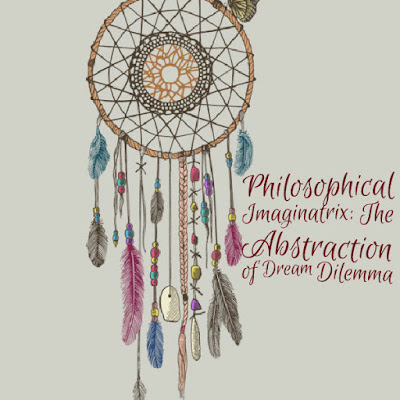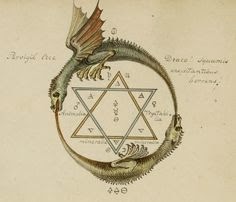Philosophical Imaginatrix: The Abstraction of Dream Dilemma
Dream in sanskrit is called Swapna (Svapna). It is a stage at which the human experiences all his senses only through his mind. This stage of dream is called 'Taijasa'. The consciousness is divided into three stages. The first stage is the 'Vishva', the waking stage of gross body (sthula sarira). The second stage is called 'Taijasa', the dream stage of the subtle body (sukshma sarira). And the third stage is called the 'Prajna', the deep sleep consciousness which is the experience of the brahman.
Dreaming is a weird phenomenon.
We close our eyes and go into a temporary hibernation which is called sleep. And in that sleep we experiences various things which are absurd and unrelated. A person while in dream reaches the top of everest, without even knowing what everest looks like. Dreaming the experiences is a thought away. It's like googling certain things and reaching there mentally. And experiencing that place with our senses. We feel we are awake inside the dream world. Sometime people don't even realize its a dream, until and unless they wake up. The dream becomes their reality. In few seconds, a dreamer lives a lifetime. A poor man lives a life of a king. And a king dies of cancer. And a beggar becomes prime minister. Experiences as such are as real as the waking world. But no time sense exists. In few seconds or minutes, a person lives experiences, he can never experience in the waking world.
In the dream stage, the waking experience is not there. In the waking stage, the dream like experience is not there. And in the deep sleep stage, both waking and dreaming experiences ceases to exist. These three stages are the manifestation of the gunas (sattva, rajas and tamas). And the universal consciousness (brahman) is a witness of all three stages. A very very silent witness.
To understand the nature of life and existence, it is important to understand the three stages. For now, we are discussing about the dream stage. The stage of Taijasa.
Dream represents the unconscious deeper mechanism of making sense of the waking world. It projects information of man as the root of civilization. Dreams are symbols and metaphors of our waking life. And if we can make sense of it. We can make a huge sense of our existence. Swami Sivananda explains that during the dream process we can wash away certain of our karmas. He says, when a King suffers a fate of beggar and dies of starvation, certain degree of his karmic remains are purged out. The mind is like a wildfire in the dream stage. It has no restriction. It's a subconscious release of human existence. Just like sex. It releases stress of the deeper levels. We exist because we dream. We evolved because of dreamt. Dreams are the manifestation of impulses received in the waking stage. The self is not at ease even during the stage of dream.
In the vedic scriptures, the dream is called 'Sandhya'. A midway between the waking and sleeping stage. Between the jagrat and sushupti stage. For a seeker, dreams are also a way of understanding his footholds in his spiritual awakening and his moral conditioning. A seeker starts to dream of his sadhana. And his dreams becomes of sattvic nature.
We also must ask the question, who is that who sleeps and dreams? Who is that who wakes up? We would simply answer, it is me. I sleep, I dream and I wake up. But who is that 'I'. But if 'I' sleep because I am tired and 'I' am resting. Why am 'I' hustling in the mind? Does that not mean I am just acting of sleeping, but not sleeping. But just playing a game of mind. Which means mind is different, since 'I' plays the mind. If so, who is that 'I'. This means that though we are physical body, 'I' is not a physical thing. Its beyond physical. Can we thus say that even after our death, that 'I' will still exist? This is a bit complex.
In Katho Upanishad, it is said that it's the creator of the creation that places the karma in the dream stage. But since that creator is also 'I', because I am the part of creator. Does that mean that I am just playing a game of hide and seek.
We have many examples of people receiving higher impulses and information during dreams. Prophets are said to have received messages in their dreams. Apostles and sages. Poets and writers say they visualize their work of art in their dreams. We have stories about them. For example, Viswamitra sees a dream where lord Shiva teaches him the 'Ram Raksha Mantra'. And he writes it down as soon as he wakes up. Its almost like a transmission being received on a radio. Edgar Cayce, used to receive information about medicines in his dreams, which he used to write down subconsciously. Ramanuja, the great mathematician says, "Because the images of a dream are produced by the Highest Lord Himself, therefore, they have prophetic significance".
Swami Sivananda explains that dreams are also our paths to understand life and attain liberation. He explains-
"There is logic in our dreams or rather the logic of our waking consciousness is just like the dream logic. The great philosopher Hegel constructed his logic without taking into account what the dream logic has to reveal. Now logic, which at the same time claims to be a system of Metaphysics, cannot be complete without taking into account the absurd constructions of dream experience. Logic is only a tool of intellect, which enables it to deal with the waking experience alone. This fact is revealed to us through the study of our dreams. The real must transcend all logical categories; or the categories by which it can be comprehended have to be such as will not only suffice to catch the waking experience but the dream experience too. This simply means that it should be broad enough to comprehend both the conscious and the unconscious life of a man. To conceive of such a category cannot be the work of waking consciousness. Such a category must necessarily transcend both the waking and the dream consciousness. Thus we are lead to the necessity of intuition or a logical thought to comprehend Reality, when we begin reflecting upon our dreams."
Dreaming and waking are both the process of perception. Something is perceived, and that perception becomes the reality. A relationship is formed between the subject and the object. In both cases we see something and that is what we define our reality as. If we think of our life during our childhood. It's almost like dreaming. It's not there, and we have no way of proving it. But we know we have lived and experienced it. Such is the nature of dreams. Dream stage and waking stage, hence seem to be an illusion/ maya of our perception. What is real is what is that which is the observer, not the perceiver in both of the stages. The observer of the perceiver of the dream. And the observer of the perceiver of the waking stage. The observer is the real self. Which is not dictated by perception. This is why, Gurdjieff made the remark that everyone is asleep. Because everyone is living in a dream stage even while waking up. No one is awakened. All are dictated by the illusions of perception.
Our life is nothing but a long thread of a singular dream. And it is here where time seems to be existence. Our dream requires sense of time to make sense of itself, and our wake stage is nothing but a calm picture of our dream. Think about what you ate yesterday. Think of what you did in your dreams yesterday. In both cases, you think of the experience you had when you did those things. Now this is what illusion is. Our experiences are nothing but projection. And our projection are the output of our desires. Our life is a great imagination cycle. The vedic texts explain that The Abhimani (person thinking upon) of Svapna Avastha (dream state) is Taijasa. Taijasa is a Vyashti (individual) Abhimani. The Samasthi Abhimani (cosmic state) is Hiranyagarbha(the microcosmic egg), the first-born.
A parable is drawn in the Prashna Upanishad. The grandson of Sun (Gargya) questioned Maharshi Pippalda:
“O Bhagavan! What are they that sleep in man? What wake in him? Which is the Deva who sees dreams? Whose is this bliss? On what do all these depend?”
Pippalada replied: O Gargya! Just as the rays of the sun, when setting, become one in that disc of light and come forth again when the sun rises again, so all of these become one in the highest Deva—the mind. Therefore, at that time, that man does not hear, see, smell, taste, feel, does not speak, nor take, nor enjoy, nor evacuate, nor move; they say ‘he sleeps’.
I had written a poem before few years. Which read-
Dreams dream to dream their dream
Dreaming is the process of dreamers dream.
Such is the nature of dream. The dreamer is the dream. And the self is the dream that self dreams. A dreaming process, is the waking process. Both are the process of dreamer's dream. Both illusions. Both unconscious. Our true seeking is to find what is beyond dreaming world and the waking world. because both are the process of imaginative perception process of dreams.



Comments